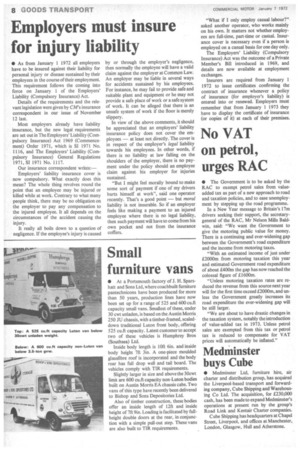Employers must insure for injury liability
Page 10

If you've noticed an error in this article please click here to report it so we can fix it.
• As from January 1 1972 all employers have to be insured against their liability for personal injury or disease sustained by their employees in the course of their employment. This requirement follows the coming into force on January 1 of the Employers' Liability (Compulsory Insurance) Act.
Details of the requirements and the relevant legislation were given by CM's insurance correspondent in our issue of November 12 last.
Most employers already have liability insurance, but the new legal requirements are set out in The Employers' Liability (Compulsory Insurance) Act 1969 (Commencement) Order 1971, which is SI 1971 No. 1116, and The Employers' Liability (Compulsory Insurance) General Regulations 1971, SI 1971 No. 1117.
Our insurance correspondent writes:—
Employers' liability insurance cover is now compulsory. What exactly does this mean? The whole thing revolves round the point that an employee may be injured or killed while at work. Contrary to what many people think, there may be no obligation on the employer to pay any compensation to the injured employee. It all depends on the circumstances of the accident causing the injury.
It really all boils down to a question of negligence. If the employee's injury is caused by or through the employer's negligence, then normally the employee will have a valid claim against the employer at Common Law. An employer may be liable in several ways for accidents sustained by his employees. For instance, he may fail to provide safe and suitable plant and equipment or he may not provide a safe place of work or a safe system of work. It can be alleged that there is an unsafe system of work if the floor is merely slippery.
In view of the above comments, it should be appreciated that an employers' liability insurance policy does not cover the employees — at least not directly. The cover is in respect of the employer's legal liability towards his employees. In other words, if there is no liability at law falling on the shoulders of the employer, there is no payment under the policy should an employee claim against his employer for injuries sustained.
"But I might feel morally bound to make some sort of payment if one of my drivers hurts himself at work", said one operator recently. That's a good point — but moral liability is not insurable. So if an employer feels like making a payment to an injured employee where there is no legal liability, then such payment will have to come from his own pocket and not from the insurance coffers.
"What if I only employ casual labour?" asked another operator, who works mainly on his own. It matters not whether employees are full-time, part-time or casual. Insurance cover is necessary even if a person is employed on a casual basis for one day only.
The Employers' Liability (Compulsory Insurance) Act was the outcome of a Private Member's Bill introduced in 1969, and details are now available at employment exchanges.
Insurers are required from January I 1972 to issue certificates confirming the contract of insurance whenever a policy of insurance (for employer's liability) is entered into or renewed. Employers must remember that from January 1 1973 they have to display the certificate of insurance (or copies of it) at each of their premises.




















































































